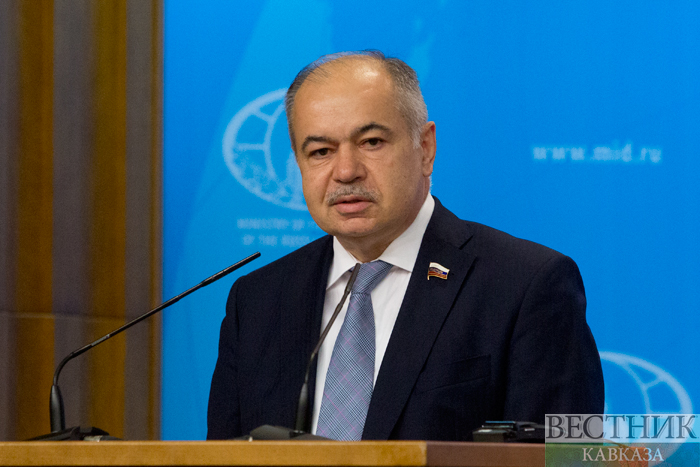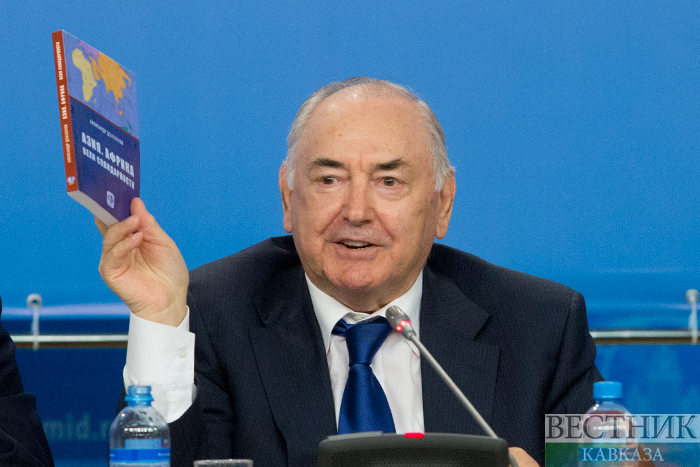The first conference of the Russian Committee of Solidarity and Cooperation with the Peoples of Asia and Africa in the format of an all-Russian organization was held in Moscow. According to the deputy chairman of the Federation Council, the president of the Russian Committee for Solidarity and Cooperation with the Peoples of Asia and Africa, Ilyas Umakhanov, work in this direction has been underway for 60 years: "The Eastern saying goes: "Dig your well before you're thirsty". We do not forget origins, we rely on our experience and traditions of the work of the Soviet Committee of Solidarity and Cooperation with the Peoples of Asia and Africa, which is still remembered and respected in the world... Thanks to the noble, selfless work of a huge cohort of remarkable patriots and professionals, we managed to keep our organization in the difficult period of the USSR dissolution and in the difficult 1990s".
"We are sincerely pleased with the attention of our friends from the CIS countries, who stood at the origins of the Soviet Committee of Solidarity with the Peoples of Asia and Africa. The presence of representatives of diplomatic missions of friendly CIS countries, China, India, Egypt, Syria, Morocco and Madagascar in this hall will guarantee the fruitful work of our organization to ensure cohesion and solidarity, as well as unity to counter threats of terrorism and extremism, poverty and social inequality, export of democracy, Interference in the internal affairs of states. I mean counteracting those new challenges of our time that are insoluble without involving civil society institutions, goodwill, honest and caring people," Umakhanov said. According to him, the registration of the all-Russian public organization 'Russian Committee for Solidarity with the Peoples of Asia and Africa', which was held in February this year, was preceded by a difficult organizational stage, when branches of the organization were created in 45 regions of Russia and new versions of the charter of the committee were prepared.

Ilyas Umakhanov
"In today's world it is difficult to overestimate the importance of people's diplomacy in solving global and regional problems, building up bilateral ties. It is the public institution, public initiatives that allow significantly broadening the horizons of interaction in the humanitarian, trade and economic spheres, making it more dynamic and meaningful. Principles of solidarity are based on the moral position of people. They do not lose their relevance even when the state structure is changed. Therefore, the seeds of cooperation, sown in the Soviet era, are growing today with good shoots and return the sincere support of people around the world back to our country. As long as hearts of our compatriots living abroad, graduates of Soviet and Russian universities, other people devoted to Russia, there is a sense of community, solidarity and support, and all attempts to isolate Russia, press on our country through sanctions are doomed to complete failure," Umakhanov is convinced.
The Russian Committee for Solidarity and Cooperation does not replace or duplicate the functions of other structures, including state ones, but rather seeks to complement and interact with them in achieving common goals:
First, the committee should become an effective platform that integrates the scientific expertise of experts dealing with the problems of Asia and Africa, provide channels for international information and intellectual exchange.
Second, there is a growing interest in the Russian regions in the distribution of international contacts through NGOs. The Russian Committee can join in the work on disseminating positive experience in this area.
Third, it is very important to involve young people in the work of the organisation. The youth section of the committee has already started working.

Russian Foreign Minister Sergei Lavrov, welcoming the representatives of the Russian political expert community, foreign friends and guests, said: "We have long-term relations with the International Organization for the Solidarity of the Peoples of Asia and Africa. Today we continue these traditions and start a new stage in conditions when this solidarity is in demand more than ever. Russia traditionally supports the aspiration of the peoples of Asia and Africa to decide their own destinies independently. This position was manifested in the era of the struggle against colonialism, it is manifested now as well. We know how many of our Western partners are trying to turn these regions into a territory of geopolitical confrontation, promote one-sided prescriptions, impose approaches to solving internal problems from outside by their own patterns. We know how difficult it is to resist, given the financial, economic and other circumstances. Nevertheless, we see that the desire to take their own destiny into their own hands grows stronger. We stand in solidarity with it".
According to Lavrov, Russia has followed this approach for many years: "All problems of the African and Asian regions must be solved, first of all, on the basis of those approaches that are developed by the countries of these parts of the world. We act like this in the UN Security Council, whose agenda is now filled with African problems. There are attempts by our Western colleagues to offer their approaches to their settlement, proceeding, first of all, from the interests of external partners, and not of the African countries themselves. We invariably emphasize that the UN Security Council should, above all, listen to the views of the African Union, subregional organizations on the African continent, support their approaches, because Africans, like Asians, know better than anyone how to solve their own problems and resolve crises in one or another country in the region concerned. The international community, in the person of the UN and its Security Council, should support the efforts of the countries of the region to resolve conflicts, support politically, morally and financially in the form of assistance in training peacekeeping units, equipping them, and offering good offices".
The Foreign Minister noted that in order to balance the international system in the course of the ongoing discussions on the reform of the UN Security Council, Russia insists that the imbalance in the composition of the Security Council with regard to the representation of developing countries should be improved, the main focus of the work is to increase the representation of Asia, Africa and Latin America. "We have very close relations with the African Union, numerous subregional organizations on the "dark continent", as it is commonly called. We develop relations with various integration, political and economic groups that are developing in the Asia-Pacific region. We will strengthen them and build them up. In this our aspiration we will rely on the positions of the Russian civil society, which is actively interested in foreign policy issues. In this context, the Russian Committee for Solidarity and Cooperation with the Peoples of Asia and Africa has always been and remains our reliable partner. It includes, perhaps, the best minds of our country, who thoroughly know the numerous problems of Asia and Africa, contributed in many different ways to the formation of our foreign policy, directly working in the Ministry of Foreign Affairs and other state structures, both after resigning, or within the framework of their scientific and political careers," Lavrov said.
He promised to make relevant proposals to the president and the government, to make ties with the countries of Asia and Africa more specific and filled with new economic and investment content (a mutual interest is evident), in the foreign policy sphere, in the coordination of our actions in the UN.
"Countries that were running the show in international affairs for several centuries are reluctant to relinquish this role, although objectively they can no longer do this as they did in previous eras. We (and, as far as I know, your countries) do not try to defend our interests through confrontation. Of course, our actions are fair. Everyone understands it. We want a consensus in international relations. It is possible only on the basis of mutual respect, dialogue and the search for a balance of interests. I think that we will continue to strengthen our cooperation in such a constructive agenda".

The vice-president of the Russian Council on International Affairs, Alexander Dzasokhov, recalled how he was sent to work in the Soviet Committee of Solidarity of Asian and African Countries from the position of First Deputy Chairman of the Committee of Youth Organizations of the USSR in 1967: "I remember in 1960, in the second half of the 20th century, our great country's great contribution to the support of the peoples of Asia and Africa, to the elimination of colonialism and racism, apartheid and the acquisition of political independence by dozens of countries around the world. I started to write a book called 'Asia and Africa: Milestones of Solidarity'. It tells about many outstanding representatives of the national liberation movement, with whom me and my friends managed to meet in Moscow and far from Moscow. Of course, the agenda for the 1960s-1970s was different. It was colonialism, apartheid, racial segregation, and of course, the Vietnamese epic, which was a theme that united not only the peoples of Asia and Africa, but the whole world. It would be naive to try to repeat, reconstruct and thereby clone it. We are talking about the fact that today and in the future we have found answers to very serious questions that our country and the whole world are facing today".
Among these issues, Dzasokhov singled out extremism and radicalism: "Our committee, given its composition, the presence of domestic orientalists, experienced politicians, can look for ways to preempt the ideology of radicalism and extremism in order to reduce and displace fertile soil for fueling extremist and radical organizations from our reality".
He indicated Syria as the second problem: "The problem of protecting the territorial integrity and sovereignty of Syria may become common for our committee and for all national committees of Asian solidarity".
Dzasokhov considers migration to be the third problem: "There is a great, but unhappy migration of peoples. Therefore, it makes no sense to use the current models after the collapse of multiculturalism. He also called on to take care that the Eurasian project in a broad sense (and its concrete implementation within the framework of the Eurasian Union) is a priority on the agenda.






